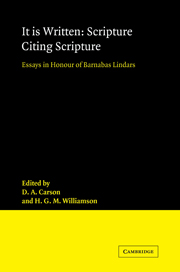Book contents
- Frontmatter
- Contents
- Preface
- Biographical note
- Abbreviations
- 1 An assessment of recent developments
- THE OLD TESTAMENT IN THE OLD TESTAMENT
- BETWEEN THE TESTAMENTS
- THE OLD TESTAMENT IN THE NEW TESTAMENT
- 11 Text form
- 12 Matthew
- 13 Mark
- 14 Luke/Acts
- 15 John and the Johannine Epistles
- 16 The Pauline literature
- 17 Hebrews
- 18 James, 1 and 2 Peter, Jude
- 19 Revelation
- Indexes
17 - Hebrews
Published online by Cambridge University Press: 16 January 2010
- Frontmatter
- Contents
- Preface
- Biographical note
- Abbreviations
- 1 An assessment of recent developments
- THE OLD TESTAMENT IN THE OLD TESTAMENT
- BETWEEN THE TESTAMENTS
- THE OLD TESTAMENT IN THE NEW TESTAMENT
- 11 Text form
- 12 Matthew
- 13 Mark
- 14 Luke/Acts
- 15 John and the Johannine Epistles
- 16 The Pauline literature
- 17 Hebrews
- 18 James, 1 and 2 Peter, Jude
- 19 Revelation
- Indexes
Summary
It is a distinction to be asked to contribute to a Festschrift in honour of Barnabas Lindars. As well as knowing him personally as a colleague for some years, I have always admired his scholarship and ability in the study of both the OT and the NT, not least in the area with which this volume is particularly concerned.
In 1983 I published a book called The Living Utterances of God in which I devoted eight pages (104–12) to the subject of ‘The Use of Scripture in Hebrews’. Since I did not wish to offer merely a rehash of this material, I decided to approach the topic of this chapter in a slightly different wray. I have instituted a comparison between the author of Hebrews and his contemporaries or near-contemporaries as far as concerns their exegesis of common or similar passages of Scripture. I believe that this will achieve the object intended by the editors of this book without running the risk of unnecessary reduplication. I have not included a consideration of rabbinic exegesis of Scripture, since the nature of the materials for this hardly allows one to regard the rabbis as contemporary with the author of Hebrews.
We begin with that figure who has always been used as a foil to the author of the epistle to the Hebrews, Philo of Alexandria. The method pursued will be to observe some of the most significant of those passages in Scripture which are used by both authors.
- Type
- Chapter
- Information
- It Is Written: Scripture Citing ScriptureEssays in Honour of Barnabas Lindars, SSF, pp. 292 - 302Publisher: Cambridge University PressPrint publication year: 1988
- 1
- Cited by



